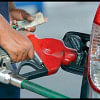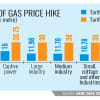Fuel price hike to have domino effect on economy: DCCI

The increase in gas tariff in June and the fuel price hike on Saturday will have an immediate negative impact on transportation, essential commodities and electricity, said the Dhaka Chamber of Commerce and Industry (DCCI) yesterday.
"This price hike of fuel, in addition to the recent price hike of natural gas, will have a domino effect on the entire economy."
On Saturday, the government raised the price of diesel and kerosene by 42.5 per cent and petrol and octane by 51.1 per cent and 51.7 per cent respectively, in order to help state-run Bangladesh Petroleum Corporation, the lone importer, refiner and supplier of petroleum products in the country, cut losses.
In June, the government hiked the gas price by 22.8 per cent.
"The cumulative impact of the price hike of fuel will cause inflationary pressure on the economy by raising the operating cost of all energy-dependent businesses and industries," the chamber warned.
Diesel is the most-consumed fuel in Bangladesh, accounting for 73 per cent of the country's total petroleum oil consumption. More than 90 per cent of the transportation sector is dependent on diesel.
Additionally, vehicles that are powered by octane and petrol will also have to bear an increased cost, said the chamber in a press release.
"This will also push up the domestic freight costs and eventually will lead to higher prices of essentials across the country."
The government increased the price of all fuels despite the gradual fall in global energy prices in recent times, according to the DCCI.
On Thursday, oil prices dropped to their lowest levels since Russia's invasion of Ukraine in February this year as the possibility of an economic recession globally is growing.
Benchmark Brent crude futures settled down 2.75 per cent at $94.12, the lowest close since February 18, reported Reuters.
Another major impact, said the chamber, will be on the production cost of agricultural products as diesel is widely used for irrigation purposes.
"Recurring fuel and fertilizer price hikes will directly impact the production cost of agricultural products and gradually hamper food security and inflict further misery on the public."
Manufacturing industries are already suffering due to electricity rationing as higher diesel and liquefied natural gas prices have forced the government to suspend the operations of diesel-run power plants temporarily.
The country has been experiencing up to two-hour power outages since July 19 as the government announced the load-shedding as part of its measures to save foreign currencies, whose reserves have fallen below $40 billion for a record high in import bills.
The DCCI recommended austerity in consumption and reduction in the fuel price as soon as it comes down in the international market considering its negative impact on the economy.
It called for ensuring a long-term energy security, drawing up a long-term strategy and continuing onshore, offshore gas exploration, energy-mix and cost- and energy-efficient electricity generation.
"Moreover, austerity in consumption should be strictly followed," it said.

 For all latest news, follow The Daily Star's Google News channel.
For all latest news, follow The Daily Star's Google News channel. 








Comments